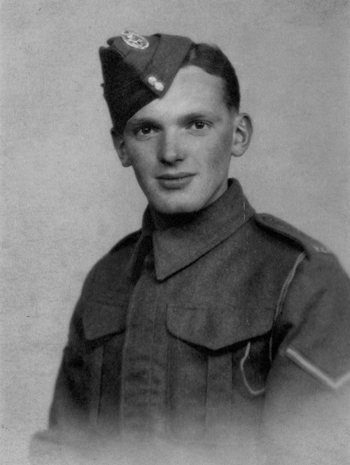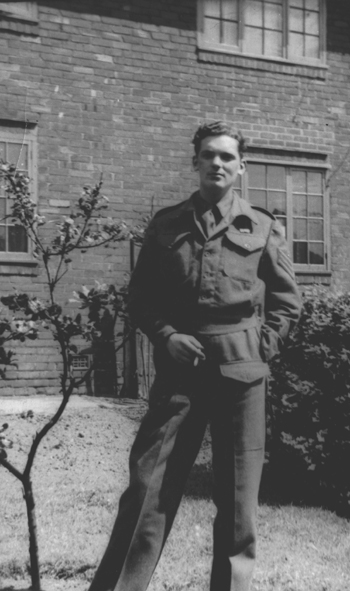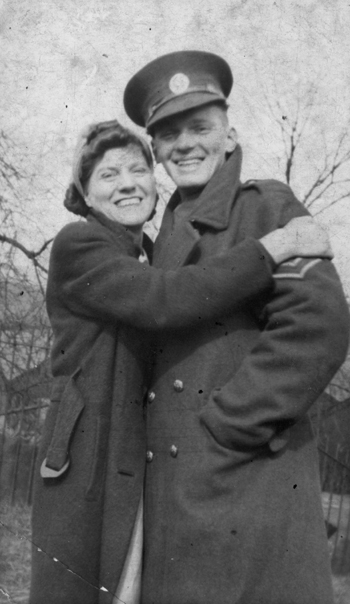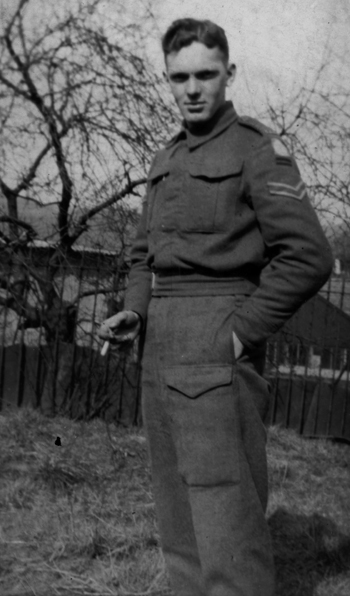 |
||||||||
To the Memory of Lieutenant Wheeler And The Men Who Lost Their Lives On 1st March 1943"A Battle In Tunisia" by Eric CropperIntroductionThis account is in memory of the officers and men of 15 Platoon "C" Coy, 6th Batt [Battalion] The York & Lancaster Regiment, who gave their lives in the Battle of Touk Ala, five miles to the N.E. [North East] of Medjez El Bab [in Tunisia] on the 1st day of March 1943. Lieutenant Wheeler was in command of the platoon, myself being next as Pl. Sgt [Platoon Sergeant] and three sections, No.s 7, 8 and 9, respectively under three NCOs [Non Commissioned Officers], L/Sgt Sherman, L/Cpl Brannon and Cpl Henry. Each section was equipped with a Bren Gun under two gunners, with a L/Cpl [Lieutenant Corporal] in charge, and four riflemen who are responsible for giving protection to the gun. Pl. HQ [Platoon Headquarters] consisted of a 2" mortar and E.T. rifle [explain?] and the rifles of myself and the officer's batman. This little group is not, as a rule, directly [involved] in any battle but take part from behind by sending over mortar bombs, the range being up to 500 yards. Prior to moving up into the line we had been in the Medjez Al Bab area for a matter of three weeks. Here we had occasionally been subjected to long-range shelling, to which we became accustomed, and the time was passed listening to the whine of the shell and guessing the point of its bursting. One or two who had experienced the war in France and Norway were at first a little nervous, especially L/Cpl Brannon who was, in my mind, suffering from shell shock. Chapter 1 - The Move to the FrontFriday 26th Feb 1943Dawn broke with us all being 'stood to' in our own positions. The weather for the most part had been rain all through the night, and we were feeling cold and wet, longing for 'stand down' at 7 am so that we could get a warm breakfast and a few hours sleep. The usual daily routine. It was just after breakfast, as I was seeing to various duties that had to be done before I could rest, when Mr Wheeler (who in future I shall refer to as 'Bert' as that was the name we had given him amongst ourselves), came over to me. He had been on a conference with the Coy [explain Coy?] Commander Capt. Kitson. Bert informed me that orders had been received to go up to the line to join Major Bewer's force and be prepared to make a counter attack should the German advance toward Medjez become serious. I immediately gathered the section comds [explain comds?] and issued orders to get their men moving and [their] kit packed. As soon as this was done we loaded the 15 CWT truck and issued every man with the correct amount of ammo. Laid down for battle, these they were to carry as we were fully prepared for a scrap and, for the most of us, eager to get in as a relief from the monotony we had been so used to. Our move was to be approximately three miles to the N.E. [North East] of our present positions and from where we were German shells could be seen bursting near a farm house, which was the HQ of the force we were about to join. At last the time came. It was 12.30 pm and I was the leading platoon behind Coy [explain Coy?] HQ. As we started to march the rain came down so gas capes had to be worn owing to the heat of the day [explain Gas Capes?]. A heavy mist lay over the hills for which we were making and, much to my relief, [it] obscured us from view of the enemy O.P. on my right [explain O.P?]. I hoped that the rain would continue until we had completed the march. Myself being used to continually getting wet I felt quite at home, and the rain, as I have mentioned, formed some kind of a screen from the enemy. All went well until we were a mile from our objective, when the rain stopped and out came the sun. And much to my dismay, two little black dots appeared high up in the sky. Each second they became larger and looked like Spitfires until, when nearly overhead, I could make out the familiar square wing of the German ME 109. What seemed [to be] slowly they began to turn. We all wondered which way and [whether] it was turning towards us. We kept on marching expecting to hear their machine guns open up at us. I looked up on either side of the road and there wasn't a piece of ground that would afford cover within half a mile. So as I marched I uttered a silent prayer and, to my surprise, the planes flew back to the German lines. I knew what to expect from this manoeuvre, and it happened. The enemy light artillery opened up on us and Bert, who was bringing up the rear of the Coy [explain Coy?], told me later that they came very close to us. Luck was with us and we arrived safely, and we were shown our billet areas for the night. Some of the men went to fetch food while others dug shelters to sleep in. Bert and I went to a ridge half a mile away and placed a section out for local protection. We sat up here and enjoyed a smoke. Whilst we were on the ridge Capt. Kitson came, to check up, and he went away to meet the Brigadier. He also called for Bert to join him. The shelling was still going on. After another smoke, I made my way to HQ to find out the delay in food not being up, and I was just in time to hear the Brig [Brigadier] say, "Good luck to you and all who go with you". This was addressed to the Captain. My heart missed a beat. Surely we were not moving again. Our sleep of the past few nights had been spasmodic and we were tired out - but alas it was true. Bert called to me to gather the platoon together, Food was brought and he told us that at dusk we were to move up to the French [position] to help strengthen their positions as the enemy were moving in another direction and the need for a counter attack was not so vital as before. The enemy shelling had now stopped, after our own arty [artillery] had sent them a few salvos of heavy stuff. But the rain had stopped and at 6.30 pm we once again set off. This time the Coy [explain Coy?] Command had to find his way along a river bed and over the hills. The distance would have been over two miles, had we been able to use the road but it wasn't possible so we had some hard going. Men kept falling etc... and it was hard to keep together. Eventually we came to a cactus grove and we were told to draw blankets and get down to it. The time was now 2.25 am. There were not sufficient blankets to go round but being tired we slept just the same to be woke up at dawn to a clear sky. Saturday 27th Feb 1943 It was now the 27th Feb and a bright sunny morning. In the distance we could hear gunfire and see 'ack ack' from our own guns firing at enemy aircraft. Breakfast came up at 08.30 and we ate well. During the meal a French 75 [explain 75?] kept popping away at Gerry [Germans] and squadrons of heavy enemy bombers flew over and we had to lay still. After the meal Bert told me to see the men got a clean up and then they could rest while he went up to the HQ for news and orders. I got all my work done and L/Sgt Shearman and myself made a shelter to sleep under. We then had a walk round and found we were in a small Arab village where bread could be had for a few francs - also eggs. Needless to say, we did ourselves well. I had a talk with a number of French soldiers and found that the news wasn't too good. The enemy were making in our direction. On my way back from the square I met Bert who told me dinner would be up at once, and afterward [that] we were to move 600 yards to the north of the village and take up positions to strengthen the French 2/5 A.T. Regt [explain?] who were on our right. Immediately I had to rush around getting my platoon organised and at 12.45 the Coy [explain Coy?] moved off, carrying all we could - with it only being a short distance. The order of march was:
.. and 13 [were] to remain in the village to take up a defensive position. The cooks were to remain there also. Bert went forward to have a look at the ground and sight positions for the sections and guns. |
||||||||
|
||||||||
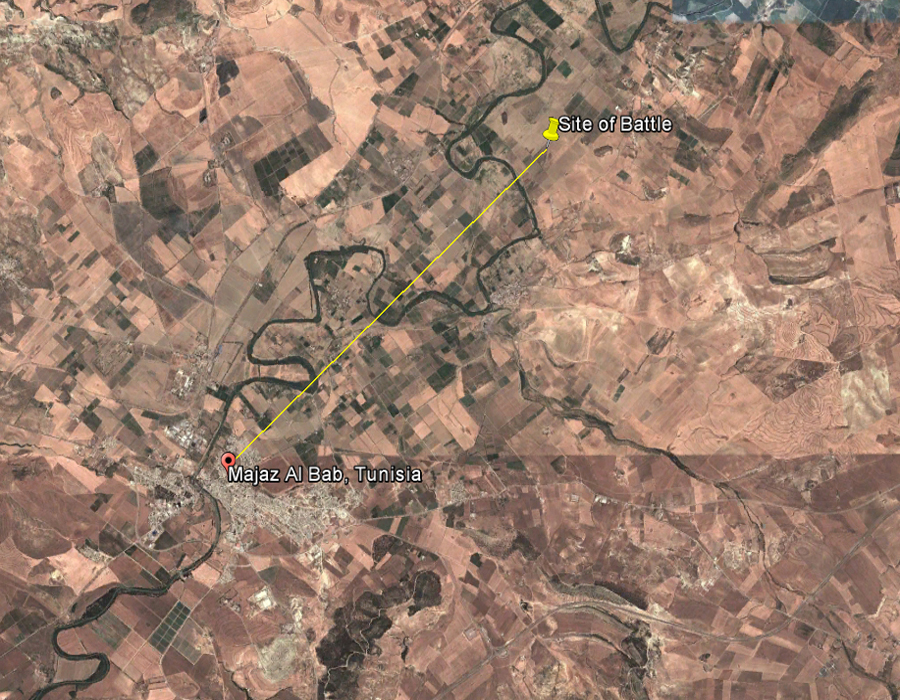 |
||||||||
| Aerial view of battle site, 5 miles NE of Medjez (Majaz) Al Bab, Tunisia (Google Earth - Click to view) | ||||||||
|
View Larger Map |
||||||||
| Aerial view of battle site, 5 miles NE of Medjez (Majaz) Al Bab, Tunisia (Google Maps) | ||||||||
Chapter 2 - The Front LineAt last we were on the foremost front of the 1st Army in the left sector of Tunisia [explain?]. I set off up the road at the head of my platoon. Sgt Naylor turned off the to the left opposite a troop of our long range guns. I carried on a little further and met the CSM [explain?] and it wasn't until he said, "Good hunting Eric" that I realised we were to be the forward platoon. On turning a bend in the road I saw Bert on the point of high ground to my right. I cut across to him and we placed the sections out in their positions. Then Bert gave us the news that German troops were advancing in our direction and that we must get started at once to prepare trucks - and [that] the place was to be held at all costs. Fatigue parties were sent for picks and shovels. I had a party detailed to bring ammo etc but the CSM [CSM?] sent word to me that he would bring a supply up at dusk with the meal, and [so] not to bother. So all I had was 1000 rounds .303 [calibre], 2 boxes [containing] 36 grenades [and] 18 mortar bombs. This was not sufficient in my estimation and I reported it to Bert. The tea meal came up at 6.15 but no ammo arrived and at once I told Bert. Also, I reported that L/Cpl Brannon had not been seen since 4.30 pm when he was sent for tools. And just at this time a number of enemy bombs were over [us]. He seemed very nervous and asked to move to the rocks 200 yards to our rear. But I told him, "sorry old man but we stick here. Gerry is only five miles away". This was the last time I saw him. As the team meal was being issued out I spotted troops on a hilltop three miles to my right. I had been keeping a lookout through my binoculars all the afternoon. I called Bert's attention and he stood the platoon too [explain?]. As it was nearing dusk whilst he went to HQ, on his return he stated [that] there was a French patrol out but we never saw them come in. And I later learned that what I had seen were the enemy. Consequently, we lost a good hot meal - it being cold when we managed to eat it. 'A' Section was put on duty for the night. The remainder were allowed to sleep, if it were possible in the pouring rain. I had a blanket with me and Bert and I smoked beneath it. We talked of Brannon who we were sure had deserted. In the same trench as us were the one-two on the mortar and loadman. One of these kept awake to watch over the mortar, which was nearby. Bert and I split the night between us. During the night shells kept bursting in our area but did no damage. Sgt Naylor was more in the line of fire as his duty was to watch the hill on our left and the O.P. [explain OP?] which our Arty [artillery] had established on the top of it. In FIG. 1 can be seen our positions [Need scan of map?], Coy HQ [explain Coy?] and 14 Platoon with road an O.P. [explain OP?] marked in. We were to watch the road and over the hill beyond the O.P. [explain OP?] and to our right firing across the front of the French, who were in turn covering us. Even now some of us realised, or thought, that anything would happen it was so much like a scheme in England [explain 'scheme'?]. That night most of the French pulled out, leaving us with only a Coy [explain Coy?]. We were by now under the French command and by all accounts would have to stand the brunt should anything happen. So far as we were concerned our positions were finished. I was only worried about insufficient ammunition because it would be out of the question to get more if anything should start. During the night all went well and dawn broke with a clear sky and the Coy [explain OP?]standing to, waiting for full light and to get a little rest. Chapter 3 - The Enemy Are SightedAt 6.30 am Bert and I went round our positions and met the CSM [explain CSM] to whom I reported the absence of L/Cpl Brannon and the necessity for more ammo. This he promised to supply on returning to Coy HQ [explain Coy?]. Sunday 28th Feb 1943 It was now the 28th Feb - two nights at [the] front. Around 8.15 a meal was sent up to us and we ate well, after which a number of men from each section did look out whilst the remainder rested or finished little jobs with the positions. I had nothing to do apart from rest and I kept scanning the country for signs of any movement. At 11.45 I saw what seemed to be a section coming over the hills and down the road about 3 1/2 miles away. I kept them in in view for a minute and noticed more troops and transport following. I called Bert's attention to them and for a few minutes we watched. Bert thought they were Italians and he went to HQ to report same. During the time he was away I had the platoon manning their guns according to his orders. He wasn't away long, and when he returned we could make out the familiar field-grey uniform of the German Army. Everything was set to give the Bosch [a slang term for Germans - see wikipedia ] a hearty welcome. They began to open out in field formations. There seemed to be at least a battalion. The road was now a continual line of movement [but] they didn't appear to have seen us from their attitude. When about a mile from us the leading party cut across country to the O.P. [explain OP?]. This had been evacuated by our people and we could see them standing on the ridge. Just then the French opened up with their heavy machine guns [but] the range was far too great and it gave our positions away causing us to move back 200 yards to the hilltop on which Coy HQ can be seen marked in FIG. 1. As we moved across our Arty [Artillery] opened up and all of the Germans who could get to cover made a run for it, the rest never moved again. It was a grand sight to see our shells lifting them into the air and it gave us time to get down on the hill. Unfortunately it was solid rock and we could not dig in, but luck was with us; Jerry sent over mortar bombs. These did everything but hit us. And a sniper worked his way so that he could shoot at us. I had to make a dive to Bert as my few rocks were being shot away [so] I had to take the risk of being hit as I jumped for cover. The sniper was a second too late. He almost parted my hair. It made me keep down until I could manoeuvre into a firing position with my rifle. Just then Bert spotted a party of the enemy on our right. He got the Brens firing and we shot up a couple of them. We had to lay on the ridge all day. It was impossible to get any food up and during the afternoon a French sergeant major came down to us with the news that we were in a tight spot, liable to be surrounded and that they were pulling out. He advised us to do the same. Bert replied "orders are to stay and fight until the last man or the last round. We stay with or without you. We hope you will remain" But true to the French style, they beat it. As dusk fell we moved from the ridge into the valley on our left. Here positions were allotted and, at last, a meal. Seven SEC [SEC?] had to take over one of the 14-Platoon positions. We started to dig but could only get down to about three feet and had to build rocks for parapets. I asked Bert to get us out of the valley because should the enemy get on the ridge we had left it meant we had had it (in my own words). Bert replied "let us eat and smoke under our blankets Sgt Cropper, we have had it any how. Word has been sent that if we hold out for twenty four hours we will be relieved. A and D Coys of KOYLI [explain?] are making an attack on our left - tonight we hope". So with this we settled down to give the enemy a good time before they got us. Neither of us expected to come out alive. The situation was an impossible one. I let Bert sleep through the night and finished off the trench. I woke him up at 4.30 am. There had been no noise of any attack of the KOYLI [explain?]. Our Arty [artillery] had been firing and as we expected the attack had never gone in. At 5.00 am, a meal was sent up to us. This was issued out and by 6.00 am we were going around the platoon. I had decided to send for the ammo, which was long overdue, when we heard firing from our forward section. The ammo party had to return. It was too late. The battle had begun. Thanks to the CSM we had little to fight with. Later, I found the Coy [Coy?] was the same all through. Bert and I got in our trench. We could make out dim forms in the half light, a few more minutes and it would be bright enough to take part in the battle. Chapter 4 - The Battle6.15 am, 1st March 1943A day that some men will never forget. As the light became clearer I could see the forward sec. [section?] through my binoculars. I said to Bert, "L/Sgt SHearman is getting it hot, I can hear his grenades busting". Bert replied, "Tough luck. Send a few mortar bombs over and see if they will help". Machine guns were firing from all angles. Our bombs went over. We could hear screams as they burst, then all went quiet. The enemy had been stopped but only until they could push on in force. At 6.25 it started again - hell let loose. L/Sgt Shearman let go all he had and by 6.35 am he had to surrender, I saw them taken prisoner through my glasses. His number two on the gun was dead. Pte [Private] Gorman, three times shot from his weapon, he came back taking off his helmet saying "I can't see with this b***tard on" and he fired five more mags [magazines] until he received a burst of fire in his head and chest. This boy - for he was only nineteen years of age - fought like a hero. His actions have been reported for decoration. The reason he was on the gun in place of No.1 is that the No.1 was too scared to fire and cried like a child in the trench bottom. Pte [Private] Healey of the same SEC [sections?], was shot in the arm, neck and shoulder after surrendering to a German corporal who was going to turn his gun on the remainder of the men. But fortunately he was shot himself in a most convenient place. The section accounted for twenty of the enemy - including one officer. By 8.30 am No. 8 Section under L/Cpl Hannaway (who took command on Brannon deserting) had by this time been overpowered. But not without taking toll of the enemy's numbers. Their casualties were Privates Morris and Caldwell. Morris received five wounds in the shoulder and arm. The fighting in my area was now at its height. One or two men had tried to run off. These I shot under Bert's orders. We were being sniped from the ridge and up to now I accounted for it. My ammo was running low but, taking careful aim, my score soon became seven - four of whom fell off the ridge. Bert was as happy as a sandboy. Whilst taking aim at a mortar crew my rifle was twice shot out of my hands and the stone about me shot off the parapet. Bert, who had borrowed my binoculars, spotted the sniper and said, "There you are Sgt Cropper. Light a couple of cigs and give me your rifle, I will have a go". We couldn’t find the matches and Bert got a stone flung in his back. I told him to keep down but all he said was, "Put the stone back sergeant please" He knocked a couple of them off the ridge and asked for more ammo. I had now only ten rds [rounds] left but as he was loading it happened. There was a ping. Bert's hat flew off and he shrank to the bottom of the trench with a bullet hole through his head. He died fighting. He never knew what hit him. He was a perfect officer and a gentleman. It was now just turning 8.30. I picked up my rifle and evened the score for Bert. I now gave orders to the 2 [second?] mortar. I had now taken over command of the platoon. With the mortar in action we put out at least fifteen more of the enemy. We kept on firing at whatever we could see until 11.30 am when one of our men who had been taken prisoner shouted from the ridge, "You are surrounded, Advise you to pack in". I called for a check on the ammo and gave orders to fire every round. Myself, I borrowed Bert’s revolver and smashed the binoculars and compass. I lay Bert on the floor of the trench. I had to use him to stop the bullets from hitting me as my trench had been blasted away by bombs and machine-gun fire. One had passed through my epaulet. This made me take steps for safety and use Bert. By 11.35 we had used up all our ammo, and Jerry was getting impatient. I still had Bert's binoculars and I saw them line up five auto weapons ready to blast us out, and one fellow had crept up to me with a [Mauser?] gun. But lucky for me one of my lads saw him and let him have it. At 11.55 I had covered Bert up with my blanket and gave the order to surrender. We had no casualties [apart from] the officer. I had obeyed orders - "last man or last round" - and I was the last of my platoon to give in. And the ammo was gone - thanks to the CSM [CSM?]. We climbed the ridge and the Germans were very good to us - much to my surprise. Any wounded were attended to at once. The only thing was that some of the soldiers took our rings, watches, money and even cigs. But we have troops who do the same and All is Fair in Love and War. From the village we had to march 1 1/2 kilometres carrying a wounded [German] officer. He was very good to us and gave us sweets and a cig. On arriving at their HQ I met the rest of the Coy [Coy?]. We received some food and coffee. All the wounded were properly treated. A roll-call was made and our casualties were few [compared] to those of the enemy. We had lost one officer (poor Bert), one sergeant and four o.r.s [others?]. The sergeant was Sergeant Naylor of 14 Platoon. His wife had just had a child before he left England. He had only seen it for two hours. He also had a little boy of three. Fortunes of war come to every man. They Died For Their King And Country That Others May Live In Peace |
||||||||
 Design by Dalemedia, Web Design, Manchester |
||||||||
